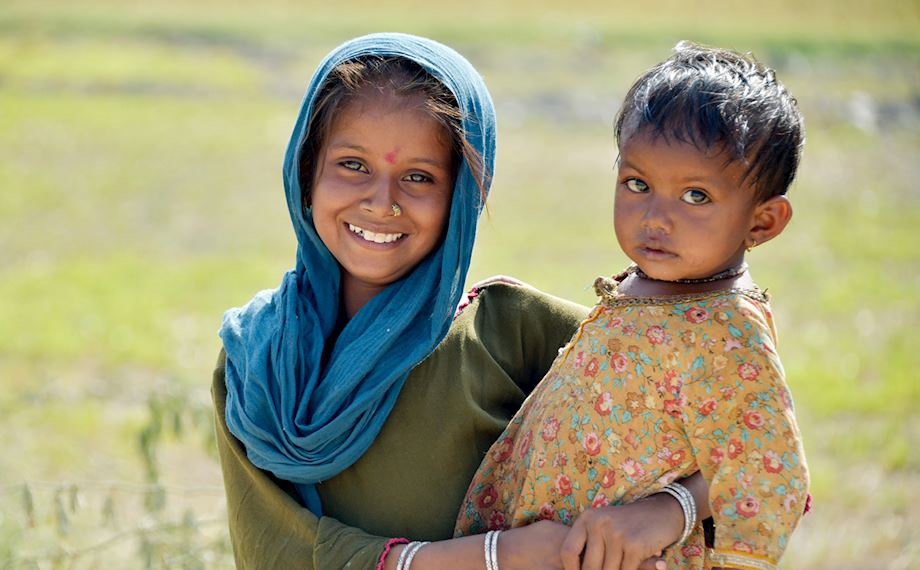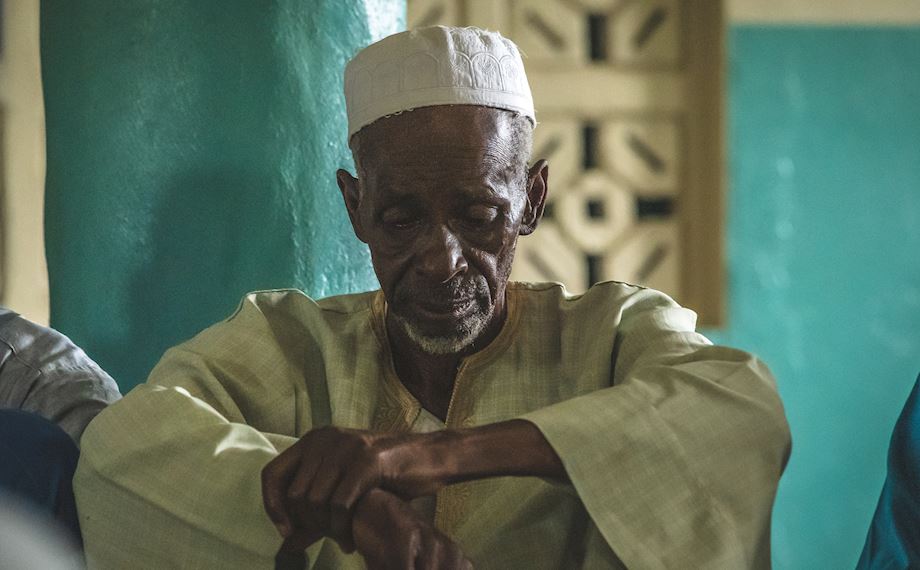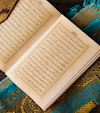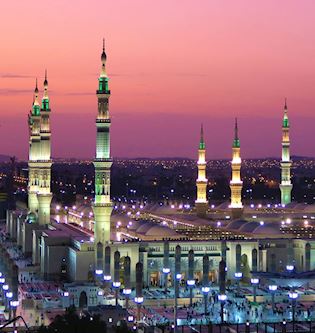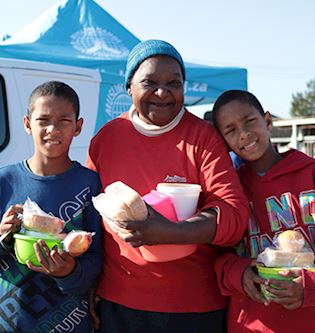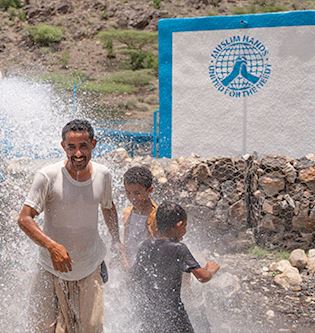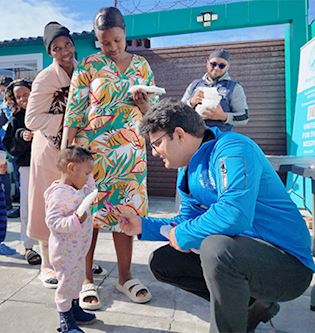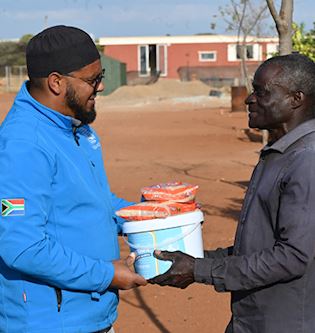The Benefits of Rabi’-ul-Awwal: its Significance, Lessons and Blessings
When is Rabi’-ul-Awwal?
Occurring after Muharram and Safar, Rabi’-ul-Awwal is the third month of the Islamic calender. Subject to the sighting of the new moon, it will begin on either 18 or 19 October this year.
The literal meaning of Rabi’-ul-Awwal is ‘the first spring’, and this year, this beautiful month will align with the spring season in South Africa.
Why is Rabi’-ul-Awwal important to Muslims?
Rabi’-ul-Awwal is considered a significant month in Islam due to the occurrence of the following events during this month:
- The birth of Prophet Muhammad (saw), the last Messenger of Allah to whom the Noble Quran was revealed.
- Hijrah, (Prophet’s (saw) journey of migration from Makkah to Madinah), took place during this month and it is from this event that the Islamic calender is dated.
- The death of the Prophet (saw), which occurred on 12 Rabi’-ul-Awwal.
Does Rabi’-ul-Awwal have any special blessings or benefits?
There are no special recommendations to fast, make Thikr or supplicate during this month, however, the abovementioned events that occurred during this month mark it as specifically blessed.
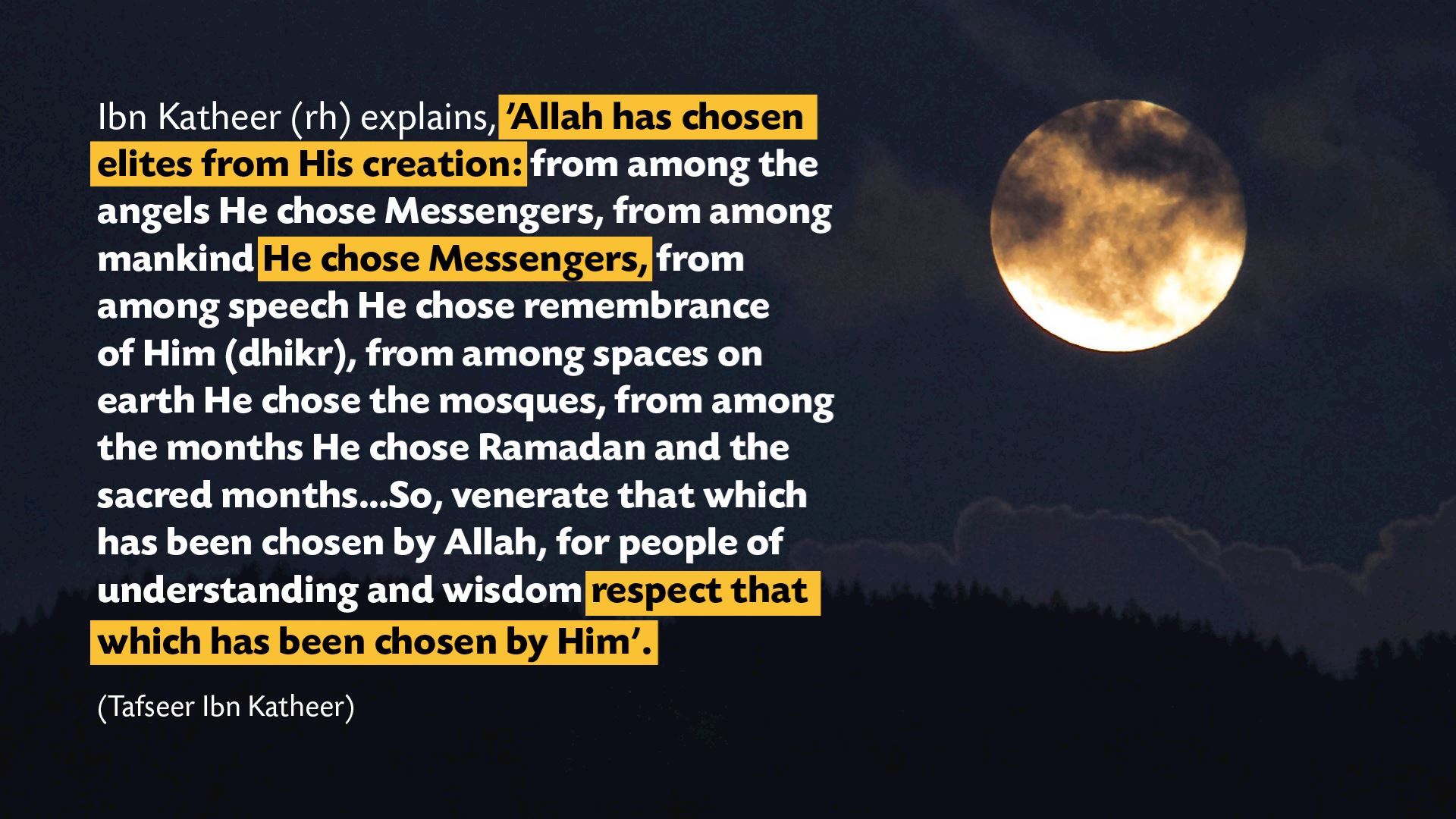
Allah chose Rabi’ul-Awwal to send the Prophet (saw) into this world, and to take His Beloved (saw) back to Him. Out of all the Islamic months, He chose to bless Rabi-ul-Awwal only this way. Therefore, this month is special and deserves our attention and respect. As such, let us take a more detailed look at the blessed events of this month and what we can learn from them.
- The Birth of the Prophet Muhammad (saw)
The Prophet (saw) was born in Makkah on a Monday in Rabi’-ul-Awwal, though narrations differ on the exact date. While many narrations say the 12th, some mention different dates between the 8th and the 17th. Nevertheless, he (saw) was born on a Monday as the hadith below states:
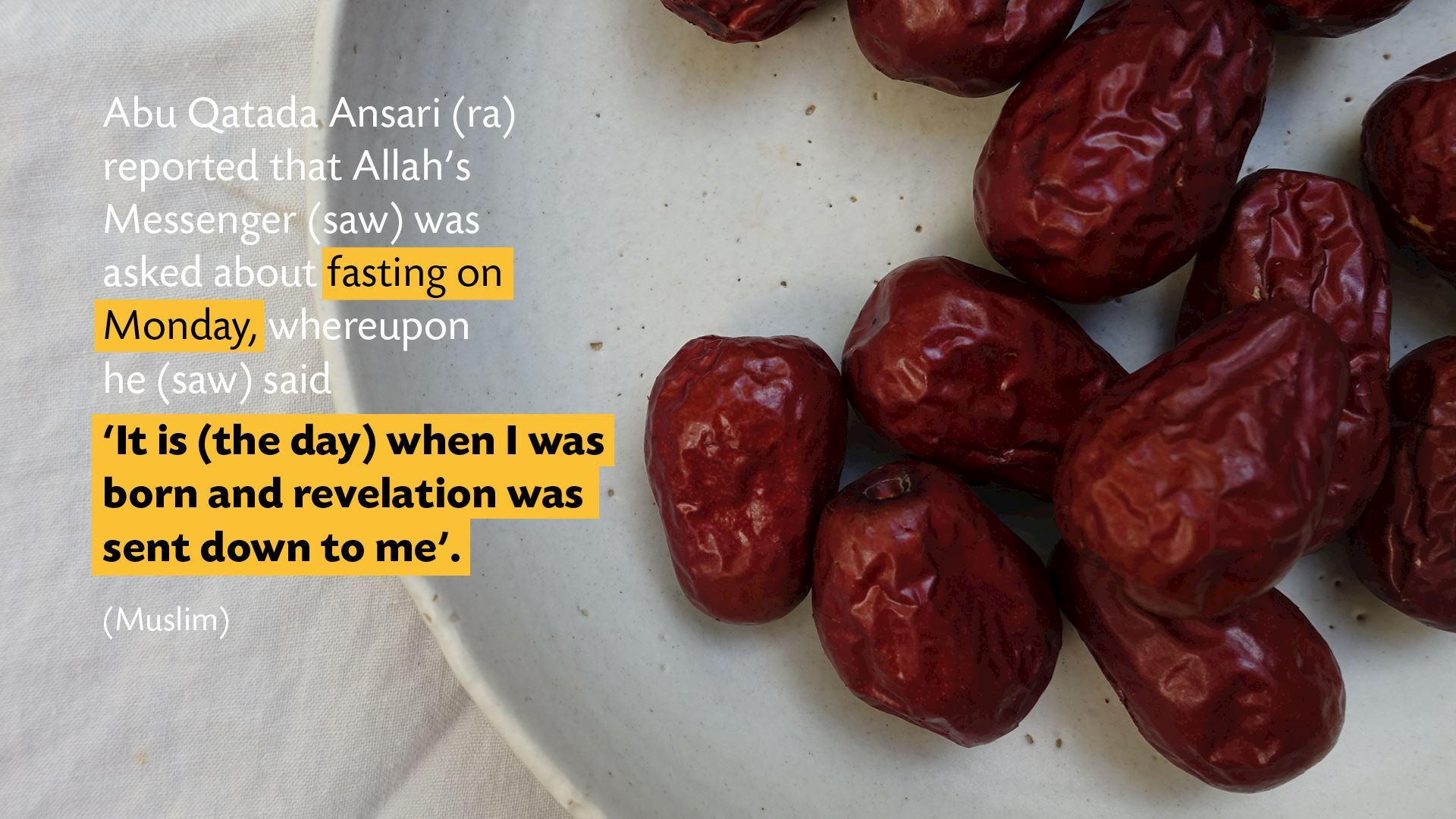
The Prophet’s (saw) birth had been anticipated for a long time. Isa (as) had mentioned it to his people five centuries earlier:
‘And remember when Isa, the son of Maryam said, “O Children of Israel! I am the Messenger of Allah [sent] to you, confirming the Torah (Law) [which came] before me, and giving glad tidings of a Messenger to come after me, whose name shall be Ahmad”. (Quran 61:6)
When rebuilding the Ka’bah, Ibrahim (as) and Isma’il (as) also prayed for the Prophet’s (saw) birth:
‘Our Lord, send among them a messenger from themselves who will recite to them Your verses and teach them the Book and wisdom and purify them. Indeed, You are the Exalted in Might, the Wise’. (Qur’an, 2:129)
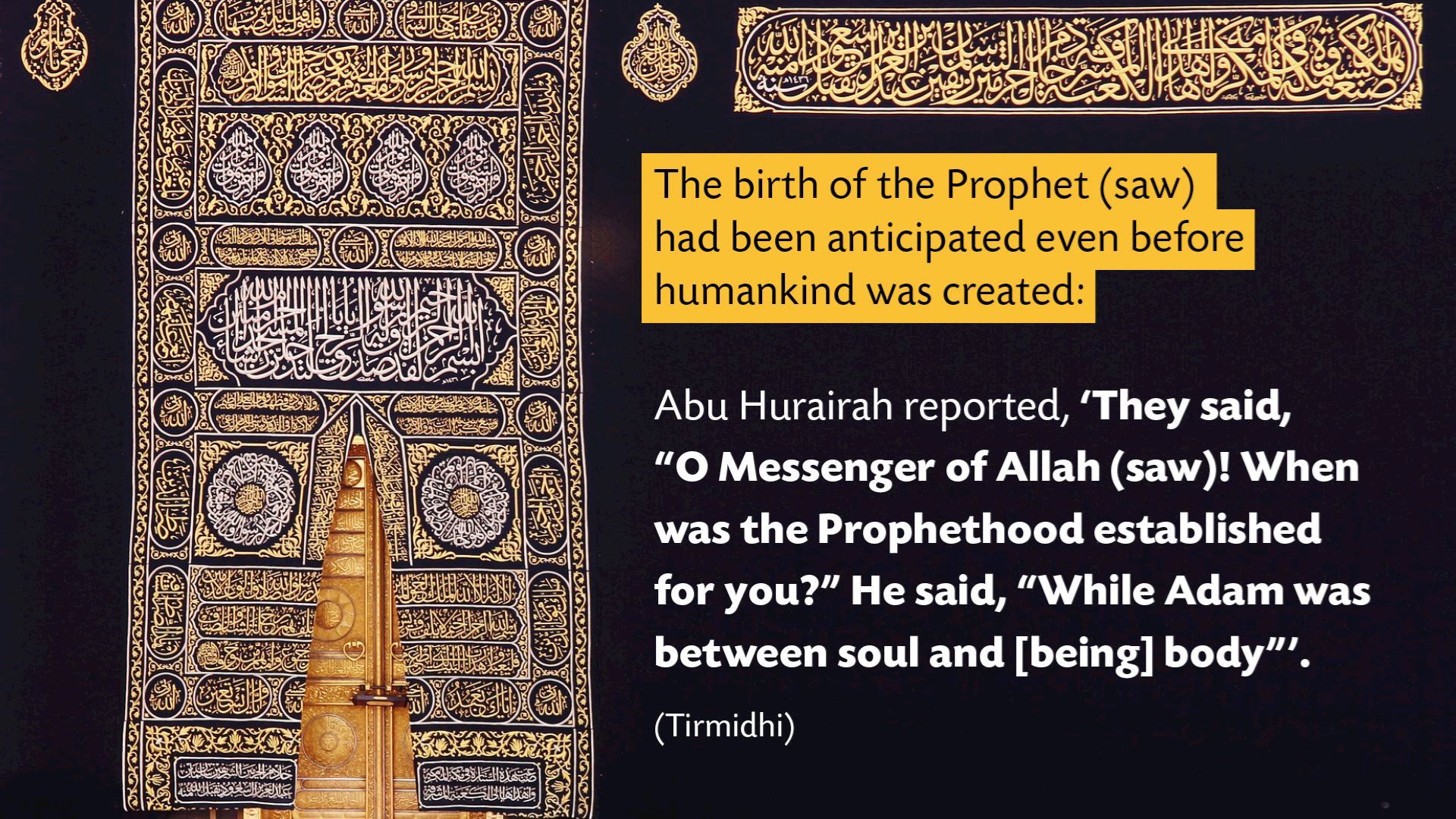
There were many miracles surrounding the birth of the Messenger (saw), “The Prophet’s (saw) mother, Aaminah, was conscious of a light within her when she was pregnant with him, which one day shone from her so intensely that she could see the castles and palaces of Syria” (Ibn Ishaq)
His foster mother, Halima, who was hoping to nurse a rich child, also witnessed miracles as her family was blessed for many years after she fostered the Prophet (saw).
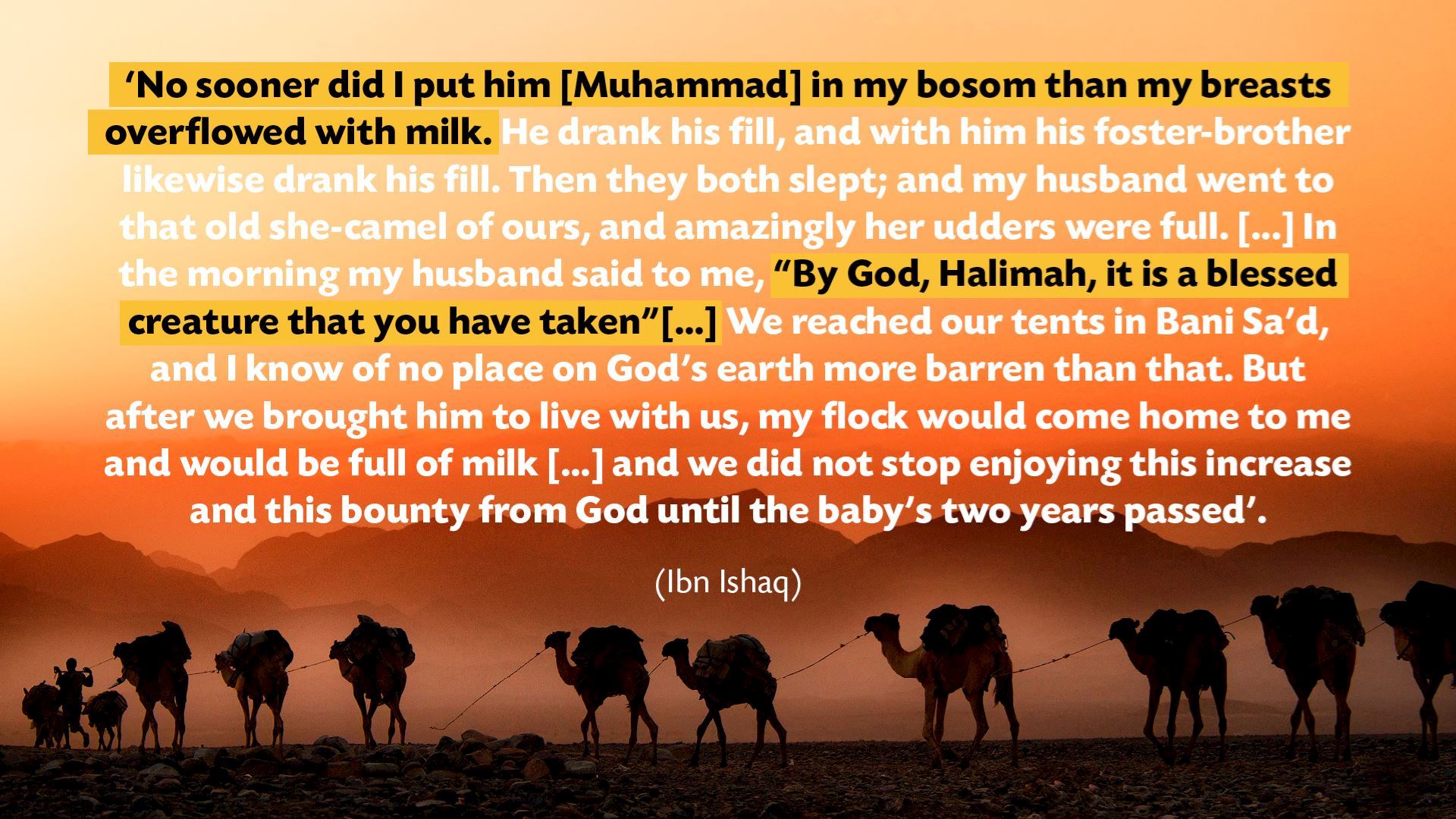
It is clear that the Prophet’s (saw) arrival was much anticipated for generations and he was widely recognised as a blessed and special child amongst the Arabs. His name Muhammad- ‘one who is praised’ was unique and was not used by any one at that time. His mother, grandfather and foster parents all knew that great things lay in his future.
What lessons can we draw from the Prophet’s (saw) birth this Rabbi-ul-Awwal?
The importance of loving the Prophet Muhammad (saw)
The month of Rabi’-ul-Awwal is a good time to reflect and remind ourselves of our Nabi’s (saw) place in our lives. He (saw) is the best of creation, and he should be dearest to us as the Quran mentions “The Prophet is closer to the believers than their own selves” [Quran 33:6]
If we do not feel this closeness to the Prophet (saw) in our heart, then the solution is simple: read and learn more about his character, life and values, and our love for him will grow naturally.
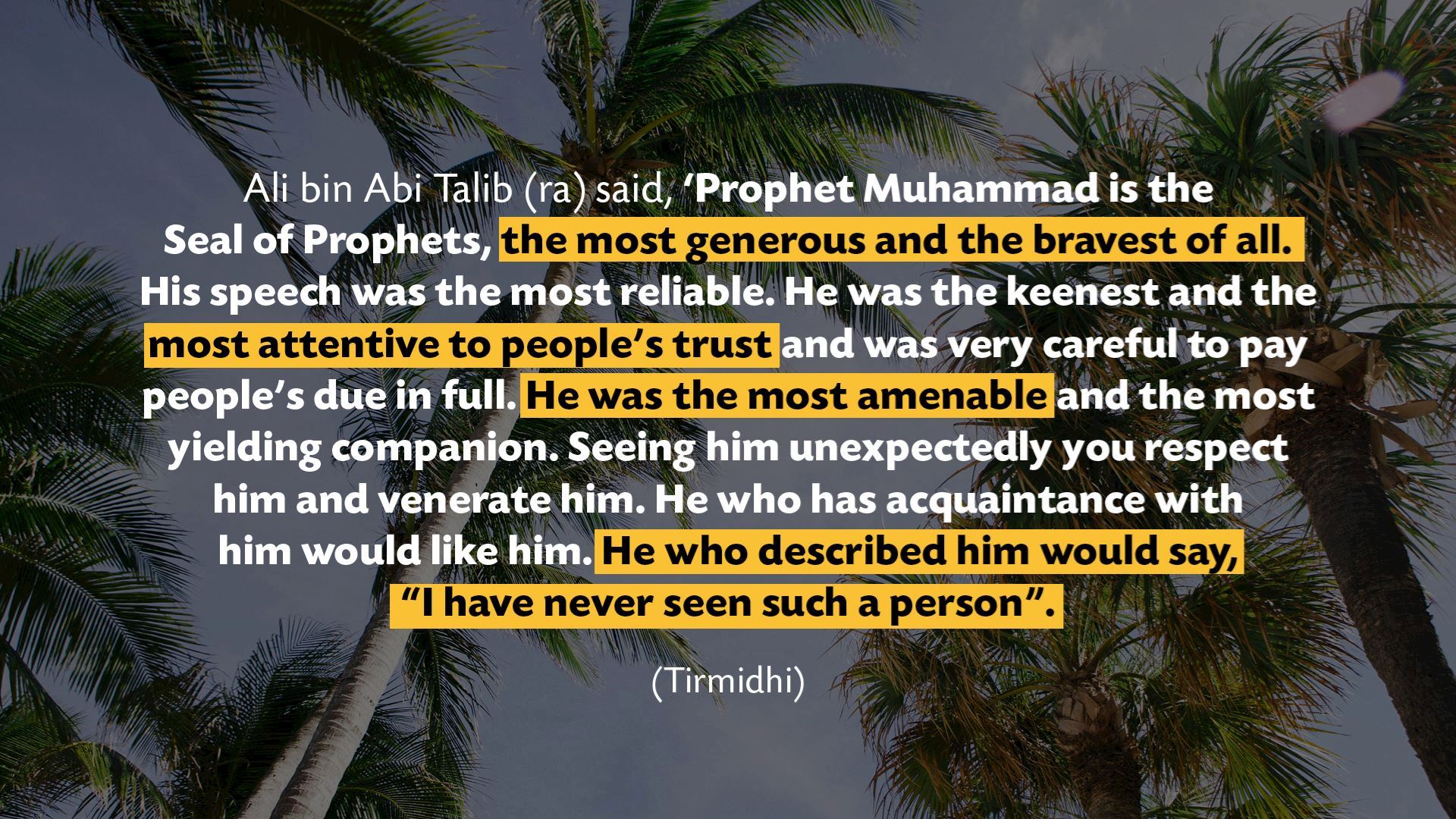
This Rabi’ ul-Awwal, why not take the chance to revive the Sunnah and strengthen your connection with the Prophet (saw). Begin reading the Seerah (Prophet’s (saw) biography), start reflecting and practising on the Prophet’s (saw) habits such as visiting the sick and elderly, feeding the poor and even smiling often.
- The Hijrah of the Prophet Muhammad (saw)
The Prophet (saw) and his companion, Abu Bakr (ra) emigrated from Makkah to Madinah during the month of Rabi’-ul-Awwal. This event marked the start of the Islamic calender, and the first year they spent in Madinah became the first Islamic year. The Islamic year is denoted by ‘AH’, which stands for ‘After Hijrah’, making this year 1441 AH.
Hijrah marked a new beginning for Muslims as the Prophet (saw) united the tribes of Yathrib, guiding them with justice, wisdom, and mercy. Later, the city of Yathrib became known as ‘Madinah-al-Munawwarah’, the Illuminated City, which is now commonly called Madinah.
Did you know that the first Masjid of Islam was also built in Rabi’-ul-Awwal? The Prophet (saw) crossed the dessert with Abu Bakr (ra) to a town near Yathrib called Quba. After staying there for 3 days, they built the first masjid and later moved onto Yathrib to build the second masjid of Islam, now called Masjid An-Nabi.
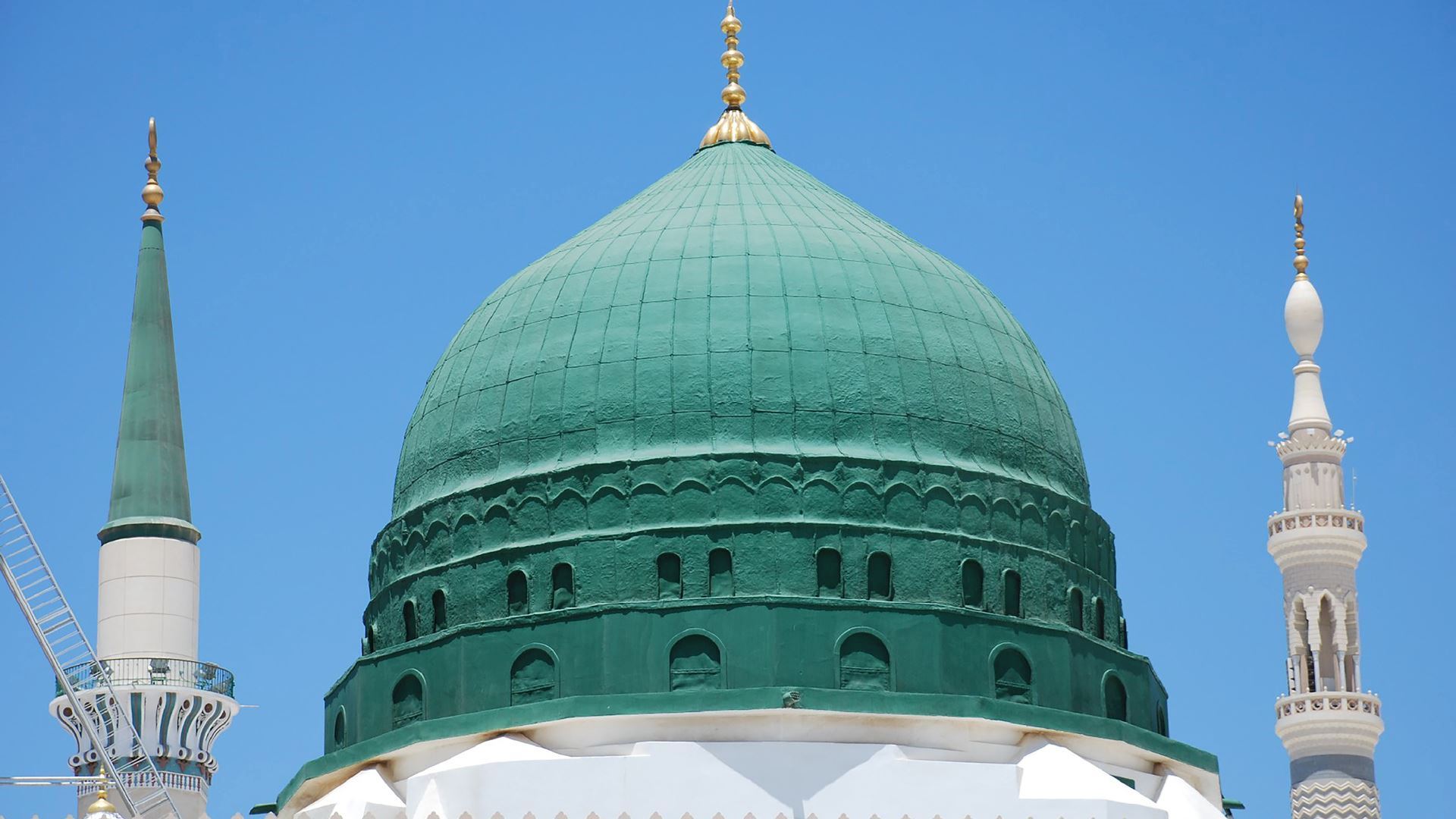
The Prophet (saw) greeted the people of Quba by saying, ‘O people, give one another greetings of peace, feed the hungry, honour the ties of kinship, and pray in the hours when men sleep. Then you shall enter Paradise in peace’.
The anniversary of Hijrah should remind us of these beautiful words. In both Quba and Madinah, the Prophet’s (saw) established a community centred around the worship of Allah swt, where the lessons of the Quran and Hadith were followed.
This Rabi’-ul-Awwal, we should strive to follow the Sunnah of the Prophet (saw) as much as possible in our daily lives.

The best way to follow the Prophet’s (saw) example is to read, understand and follow the Qur’an. Practise the Sunnah in your house by reminding yourself to be kind, generous, patient, and grateful. The Prophet (saw) is the best example for us, and this Rabi’-ul-Awwal, we should take the opportunity to remind ourselves of his pious habits and important lessons he taught us.
- The Death of the Prophet Muhammad (saw)
On Monday 12th Rabi’-ul-Awwal, in the eleventh year of Islam, the Prophet (saw) passed away.
A day or two before his death, he (saw) went to the Masjid and addressed the Sahabah from the pulpit, ‘There is a slave amongst the slaves of Allah to whom Allah has offered the choice between this world and that which is with Him, and the slave has chosen that which is with Allah’. The Prophet (saw) had been ill for a few days, and his family and companions knew that it would soon be time for him to return to Allah.
The Prophet’s (saw) passing was a great shock to the Muslims, to the extent that many refused to believe that he was no longer in their presence. Just a few hours before his death, he had gone into the Masjid and watched the people praying, and Anas (ra) later said, ‘I never saw the Prophet’s face more beautiful than it was at that hour’. To many companions, it seemed impossible that he (saw) had left them, even Umar (ra), one of the closest companions of the Prophet (saw) was adamant it was a lie. Abu Bakr (ra) however, reminded the people that the Prophet (saw) was mortal by saying, “O people! If it was Muhammad whom you worshipped, then know that he is dead. But if it is Allah whom you worshipped, then know that He does not die”.
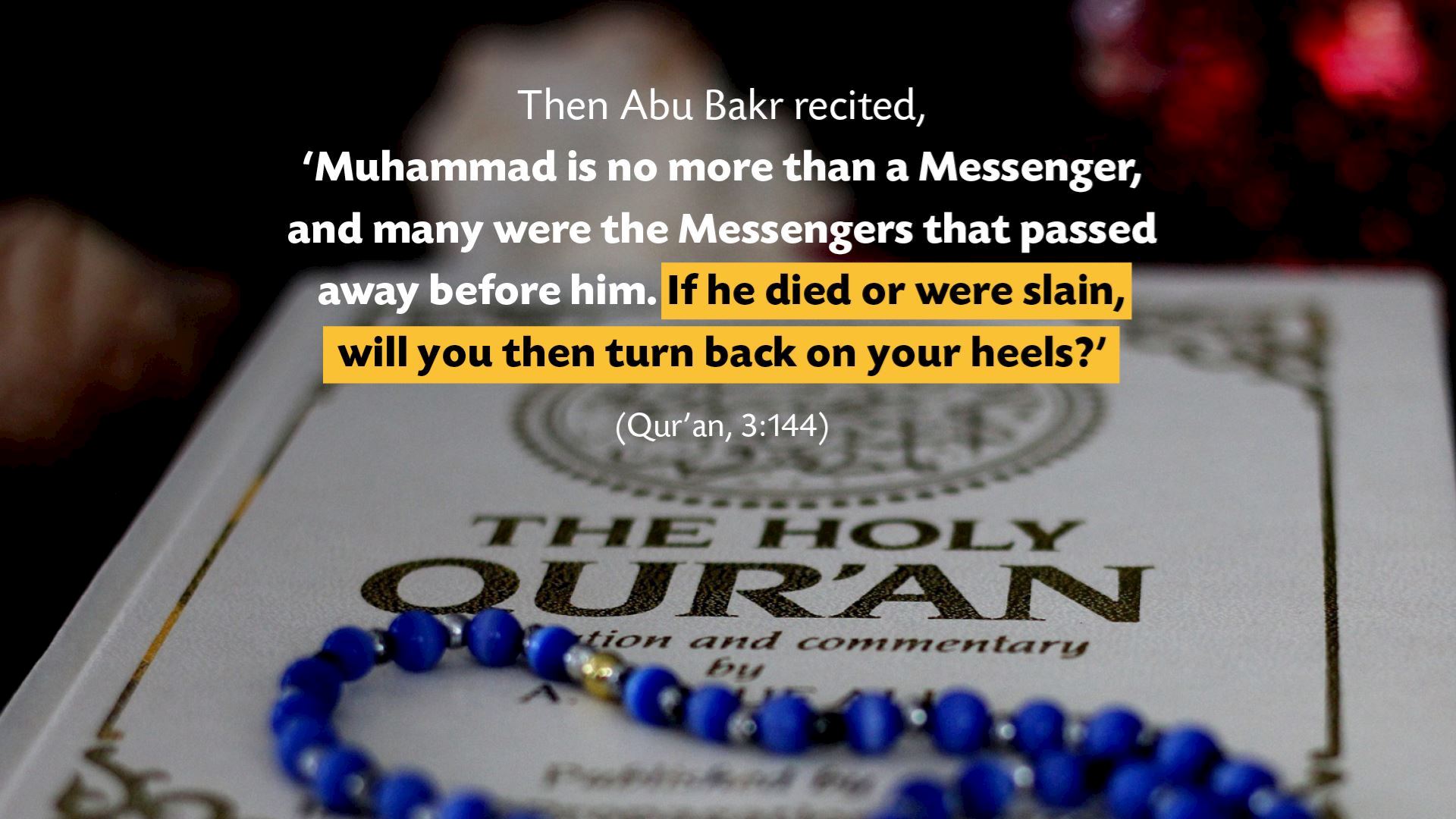
It was as if the people had not known of the revelation of this verse until Abu Bakr recited it that day. They took it from him, and it was on all their tongues. Umar (ra) said afterwards, ‘When I heard Abu Bakr recite that verse, I was so astounded that I fell to the ground. My legs would no longer carry me, and I knew that Allah’s Messenger had died’.
The grief and sorrow felt by the Muslims that day was immense, particularly in Madinah. Not only were they grieving for the demise of the Prophet (saw), but also due to the end of revelation.
‘I don’t weep for him’, said Umm Ayman, who had been like a mother to the Prophet (saw). ‘Don’t I know that he has gone to something which is better for him than this world? But I weep for the tidings of Heaven which have been cut off from us’.
As the Prophet Muhammad (saw) is the most beloved of all creation to Muslims, it is natural for us to mourn the Prophet’s (saw) death, and to feel great sadness at his loss. Consequently, here is one final lesson we can draw from the blessed month of Rabi’-ul-Awwal.
- Gratitude for the Prophet Muhammad (saw)
It is only through the sacrifices, efforts, and immense love of the Prophet (saw) that we have been blessed with the incredible guidance of the Noble Qur’an and Sunnah. Allah swt says in the Qur’an:
‘Indeed Allah conferred a great favour on the believers when he sent among them a Messenger from among themselves, reciting unto them His verses, and purifying them, and instructing them (in) the Book (Quran) and Al-Hikmah, (the wisdom and the Sunnah of the Prophet (saw)), while before that they had been in manifest error’. (Qur’an, 3:164)
Our remembrance of the Prophet (saw) is naturally more in Rabi’-ul-Awwal, however, we should not single out this month to connect with him and follow the Sunnah. Rather, we should use this month as an opportunity to build good habits so we can emulate his (saw) lifestyle throughout the year. This is the ultimate blessing and significance of Rabi’-ul-Awwal.
Above all, Rabi’-ul-Awwal is a time for being grateful to Allah for the amazing blessing of sending the Prophet (saw) to us and guiding us to His Light. It is a time for us to re-centre and ground ourselves in our purpose and revive our connection with Allah and His Messenger (saw) by reflecting more on the teachings of the Qur’an and Sunnah.
The best way of following the Sunnah practices of the Prophet (saw) is to give charity. Our Prophet (saw continuously encouraged his followers to help others, calling upon all Muslims to support their families and neighbours as well as less fortunate communities and the wider ummah. He took care of orphans and widows and regularly fed the poor, sick and elderly. Why not start following in his footsteps today and donate to our Orphan Fund.





